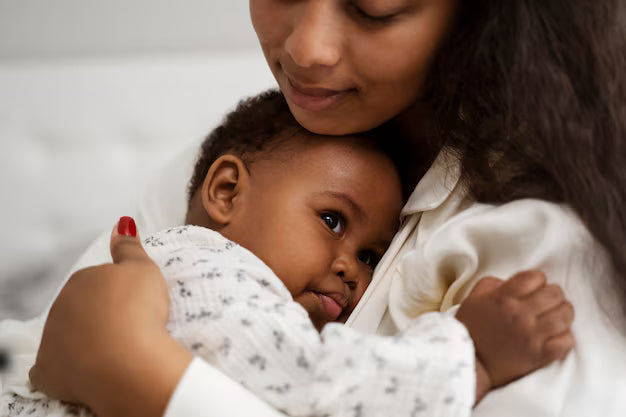
Breaking the Myth: Why Black Mothers Deserve More Than Strength
Share
Guest post by Dr. Ashley Carroll-Brown | Psychologist | Coach | Black Mama

When I became a mother, I thought I had prepared myself for everything—the late nights, the diapers, the endless feeding schedules. What I wasn’t prepared for was the anxiety that gripped me after bringing my baby home.
I remember standing in the baby formula aisle of Target after a long day of trying to pump enough breastmilk for my baby that my body just would not do. Feelings of guilt and panic rushed over me as I began to think, I’m a horrible mother. My body can’t even feed my baby. What if this formula isn’t healthy for him? What if I make a poor choice trying to care for him? Why won’t my body just work right?
And through it all, I kept telling myself what so many Black women are told: be strong, you’ve got this, don’t let them see you sweat. Immediately, I feel my chest tighten, and I begin to sob right there in Target in the baby formula aisle.
But the truth was—I didn’t have it all together, and trying to live up to that myth almost broke me.
The Burden of the “Strong Black Woman”
The narrative of the “strong Black woman” has deep roots in our history. It was born out of survival—out of a need to endure, to keep families together, to push through unimaginable hardship. That resilience is powerful, but somewhere along the way it became a cage.
We were told strength meant silence – that asking for help was weakness – that vulnerability was dangerous.
And yet, this myth comes at a cost. Black women have some of the highest rates of maternal mortality in the United States. Postpartum depression and anxiety often go unrecognized or untreated. So many of us suffer in silence because we believe we’re supposed to carry it all without complaint.
I want to say this clearly: strength does not mean suffering alone.
My Turning Point
The night I finally whispered, “I can’t do this by myself,” everything shifted. I reached out—for help, for community, for support. Therapy gave me language for my anxiety. Friends gave me permission to cry and be messy. Faith reminded me that God never intended for us to carry our burdens in isolation.
That experience not only changed me as a mother, it changed me as a clinician. I began to see my personal story reflected in the faces of so many women I worked with—women silently carrying postpartum anxiety, depression, or the heavy weight of expectation.
That’s when I committed to dedicating my clinical work to perinatal and postpartum mental health. Today, I’m pursuing certification as a perinatal mental health clinician, and I consider it both my calling and my mission to remind Black mothers that you don’t have to prove your worth by how much you can endure.
Demystifying Therapy
One of the most common barriers I hear from women is this: I don’t even know what therapy looks like, and I’m not sure it’s for me.
Let’s break that down. Therapy is not lying on a couch while someone silently scribbles notes. It’s not judgment. And it’s not about fixing you—because you’re not broken.
Therapy is a conversation. It’s a safe space to untangle the thoughts racing through your mind. It’s a place where coping tools are offered, where grief and joy can coexist, where you can finally exhale.
And yes—therapy can be culturally responsive. If you’ve ever wondered how to find a therapist who “gets it,” here are a few tips:
- Ask about their experience with perinatal or postpartum mental health, especially with Black mothers.
- Notice how you feel in the room—do you feel seen, heard, and respected?
- Look for openness—a therapist who invites your full self, including your culture, faith, and lived experience.
- Don’t settle—it’s okay to try a few sessions with someone and decide they aren’t the right fit.
Therapy is not about perfection; it’s about connection.
Permission to Rest, Heal, and Thrive
Here’s what I know: when we dismantle the myth of the “strong Black woman,” we create space for something far more powerful—authenticity. We make room for tears and laughter, exhaustion and joy, struggle and healing. We allow ourselves to be human.
And when Black mothers are allowed to be fully human, we thrive. Our babies thrive. Our families thrive.
This is why I created The Working Mama, my coaching program that helps mothers return to work after baby without losing themselves in the process. I know firsthand how hard that transition can be, and I want women to know that it’s possible to honor both your professional identity and your motherhood without drowning in guilt or exhaustion.
It’s also why I founded Guiding Hope Counseling and Consulting, my mental health practice where we walk alongside women through life’s transitions, trauma, and healing journeys. Because your story matters. Your mental health matters. You matter.
Closing
To every mother reading this: you don’t have to do it alone. You don’t have to wear strength like armor. You don’t have to prove your worth by what you carry.
It is okay to rest. It is okay to ask for help. It is okay to seek therapy.
And it is more than okay—it is brave.
Connect with me here:
- https://guidinghopetherapyllc.com for professional counseling support. You can also follow our practice on Instagram at @guidinghope_tx
- https://theworkingmama.net/info for more details about my coaching program for new working mothers
- @theworkingmamacoach on Instagram and TikTok for coaching, tips, and community for working mothers
Together, let’s rewrite the story of strength—not as silence, but as seeking support, building community, and choosing to thrive.
